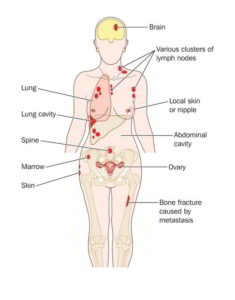Background
Bempegaldesleukin, NKTR-214, and nivolumab, Opdivo, was granted breakthrough deisgnation by the FDA for the first line treatment of patients with previously untreated unresectable or metastatic melanoma.
Bempegaldesleukin, NKTR-214, is a substance designed to stimulate the patient’s own immune system to fight cancer.
In melanoma, Opdivo is FDA approved as a single agent for the treatment of patients with unresectable or metastatic disease, and also in combination with Ipilimumab, Yervoy, for the treatment of patients with unresectable or metastatic disease.
53% of Melanoma patients responded to the combination of NKTR-214 and Opdivo and 34% reached a complete remission of the disease. This ongoing phase I/II PIVOT-02 trial is the basis for the FDA deisgination.
What is breakthrough designation?
When preliminary clinical trials indicate that a therapy may offer substantial treatment advantages over existing options for patients with serious or life-threatening diseases, the FDA grants the therapy a breakthrough designation. This designation allows the FDA to expedite the review process and if the FDA is convinced about the data and results of the clinical trials, the therapy is approved and become available to patients in a much shorter time.
About PIVOT-02 trial
In the multicenter PIVOT-02 trial, there was a range of solid tumors. In the melanoma cohort, 41 patients were enrolled and received ≥1 dose of NKTR-214/Opdivo. As of the data cutoff date, which was March 29, 2019, 38 patients were evaluable for efficacy; 3 patients had discontinued prior to the first scan due to an unrelated treatment adverse event and patient decision.
Trial findings
Interim findings were presented at the ASCO Annual Meeting 2019 two months ago and showed that 53% of Melanoma patients responded to the combination of NKTR-214 and Opdivo and 34% reached a complete remission of the disease.
The disease control rate, which is the total percentage of Melanoma patients who responded to the combination including minor response and stable disease, was 74%.
In PD-L1–positive, PD-L1–negative, and PD-L1–unknown tumors, the responses were 62%, 43%, and 33%, respectively.
There was a 100% reduction in target lesions in 42% of patients.
Overall, responses were observed regardless of PD-L1 expression or unfavorable tumor microenvironments.
Regarding safety
All of the severe treatment-related adverse events were reported in 6 patients and included atrial fibrillation; hyperglycemia; and acute kidney injury, blood creatinine increase, dyspnea, hypernatremia, and hypoxia.
The future
The ongoing phase III PIVOT 1O 001 trial is evaluating NKTR-214in combination with Opdivo versus Opdivo alone as frontline therapy for patients with advanced melanoma.
To conclude
The best treatment for a cancer patient is to get the most advanced cancer drugs in advanced stages of development. There, the hope and the chance to extend life go far beyond the standard protocols.
Contact us to find out what is the best treatment for YOU
TRIAL•IN Pharma
Do not give up on life!
Contact us 24/7 for free service matching:
Call center +44.2082.426.039
www.trial-in.com



















